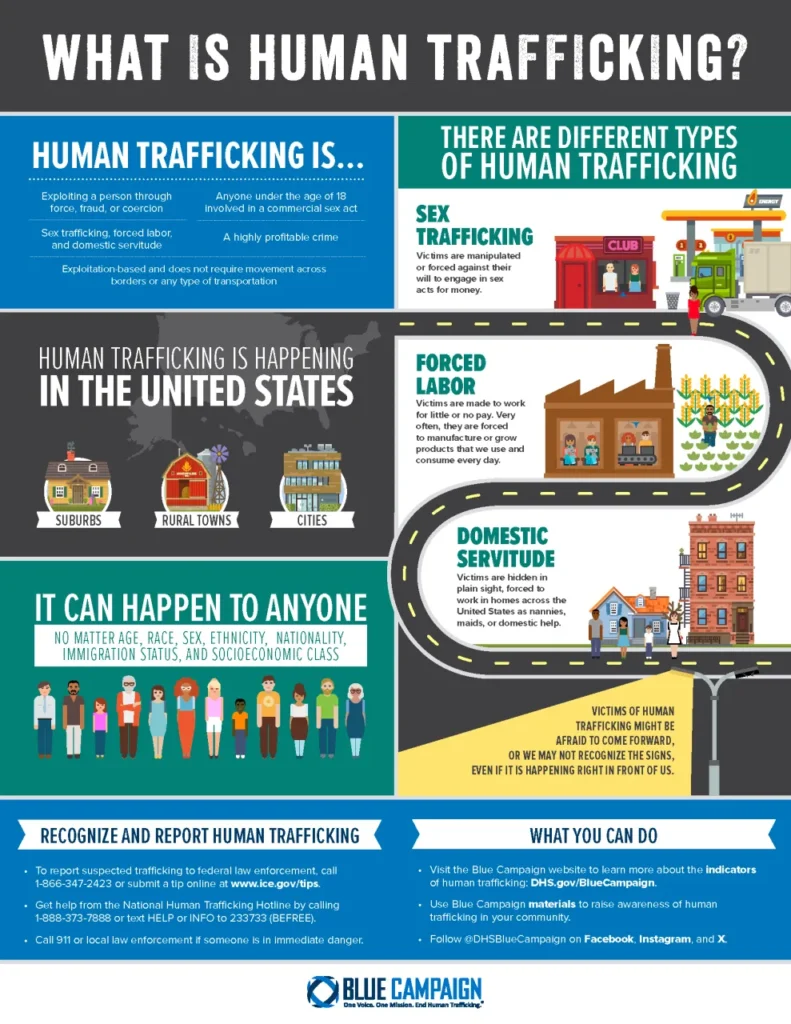What is Human Trafficking – What You Need to Know
Human trafficking is a form of modern slavery where people profit from the control and exploitation of others. Specifically, sex trafficking involves controlling individuals for the purpose of exploiting them through commercial sex acts or services. Sex traffickers use violence, threats, deception, debt bondage, and other forms of coercion to lure victims into sex work. The International Labor Organization estimates that sex trafficking generates an estimated $99 billion a year, making it one of the world’s most profitable criminal enterprises.
General Information about Sex Trafficking:
- People of all genders and sexual orientations experience sex trafficking.
- Controlled by someone else.
- Sold to have sex by guardians or partners.
- Forced to have sex with people, work in strip clubs or escort services, or participate in pornographic movies against their will.
- Forced to prostitute or sell their body and is not allowed to keep the money they earn.
- A minor coerced into sex for survival such as receiving food or shelter.
Who does sex trafficking impact?
Sex trafficking is an issue that affects both men and women from all backgrounds, with vulnerable populations such as young people, immigrants, and LGBTQ individuals particularly at risk. Traffickers often target victims by exploiting feelings of isolation and vulnerability or by preying on financial need. The sex industry is typically a field dominated by low-income jobs, making it an attractive choice for people seeking to make ends meet.
What are the causes of sex trafficking?
The root causes of sex trafficking vary from place to place and can include poverty, lack of economic opportunity, gender inequality, poor access to education, and in some cases, political instability. Traffickers often target people who are vulnerable due to these factors and use fear and manipulation to keep them exploited. Additionally, sex trafficking is closely connected to the demand for sex services which perpetuates this criminal enterprise.
Why do people become victims of sex trafficking?
Sex trafficking victims often experience complex trauma due to the physical, psychological, and sexual abuse they endure. Victims may be promised jobs in other countries only to find themselves in a sex work situation upon arrival, or they may have been coerced into sex work through threats of violence or economic pressure. In some cases, individuals may start sex work voluntarily only to find themselves in a situation of exploitation and abuse.
Sex trafficking is an issue that affects individuals from all backgrounds.
It is important to be aware of the root causes of sex trafficking and understand how traffickers target vulnerable populations in order to help prevent sex trafficking from occurring in the first place. Additionally, those who have been affected by sex trafficking should be provided with appropriate resources and support to help them recover from their experiences.
Source: https://www.unodc.org/unodc/en/human-trafficking/what-is-human-trafficking.html
It is important to remember that sex trafficking affects people from all walks of life and is driven by the exploitation of vulnerable populations. It is essential to acknowledge the root causes of sex trafficking in order to create effective strategies for prevention, protection, and prosecution. By raising awareness and working together, we can help end sex trafficking and create a safer future for all.
Click to learn more about WOAR’s Human Trafficking Support.
Help is Available
Remember – you are not alone. If you are interested in any of the services that the anti-trafficking program at WOAR offers, please call our hotline at 215-985-3333 or email info@woar.org.
If you or someone you know has been a victim of sexual violence or human trafficking, and need support, please call our 24/7 HOTLINE at: 215-985-3333 – all calls are confidential, and you can remain anonymous. If you are worried that someone may be a victim of trafficking, you can also reach out to the National Human Trafficking Hotline at 888-373-7888.
More information about WOAR’s Human Trafficking Support.






